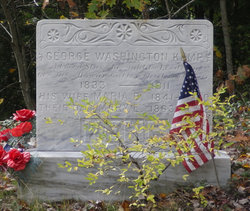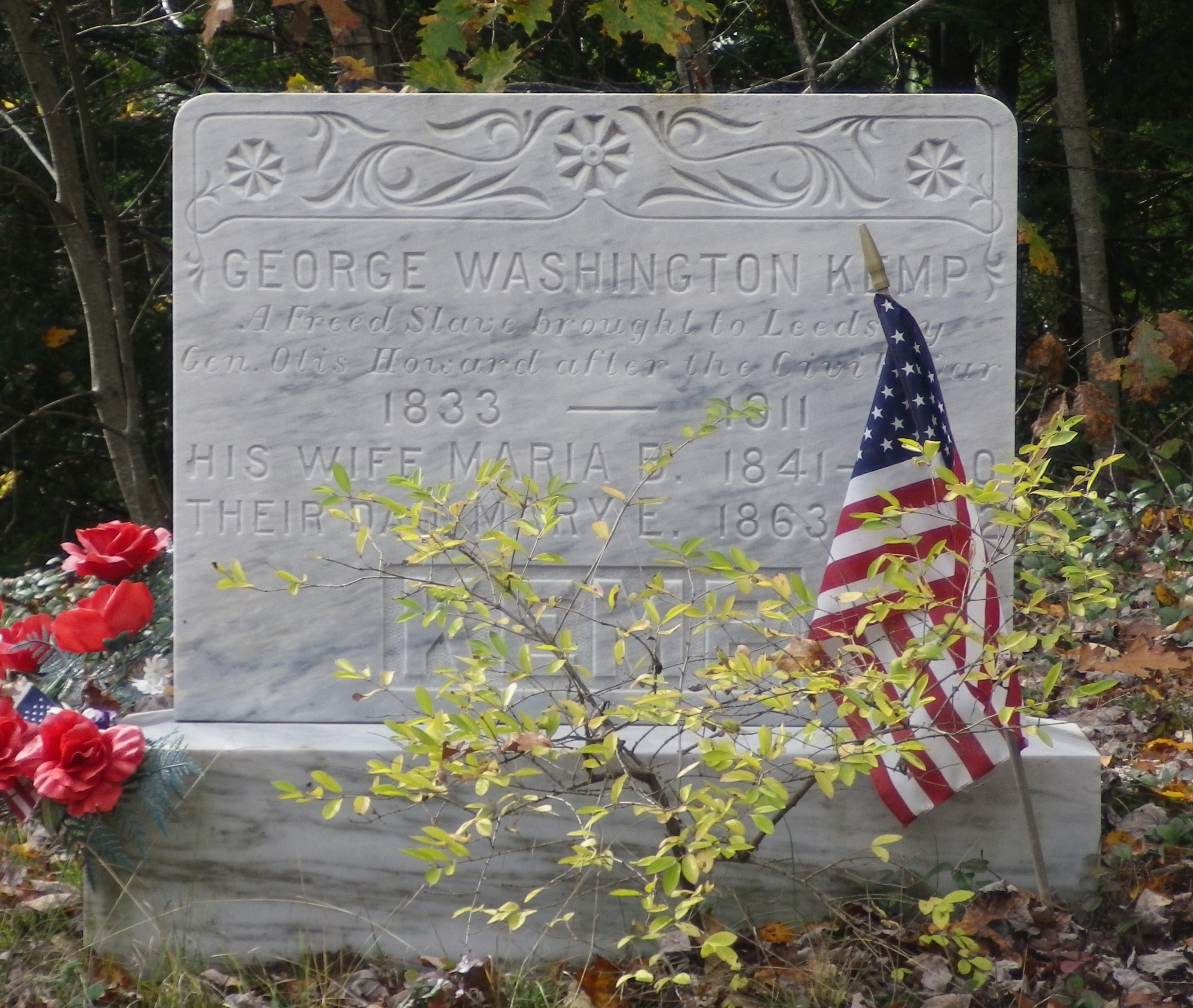There are surviving accounts of Washington's life, including in newspaper stories. In places it is clear these sources conflict or in error.
His death record says he was born in Sperryville, Virginia, though some records say he was born about 50 miles southeast in Culpeper, Virginia.
Born into slavery, at the onset of the Civil War, he was owned by Armstead Brown. He and 17 other slaves escaped behind Union lines. Although one account says he "enlisted" that does not appear to be correct. He somehow formed a relationship with General Oliver Otis Howard, and served in some capacity as an aid.
In January 1865 Oliver Howard arranged for Washington to go to Leeds to manage the farm of his mother who had been widowed for the second time the previous September, and was having difficulty managing the farm. Washington traveled with Oliver Howard's brother, General Charles Howard, and together they delivered a pony to Oliver Howard's 9-year-old son Guy. In his thank you letter to his father Guy wrote, "Wash is a very nice man and takes good care of my pony." He further added. "Grace and I are teaching Wash to read. I hope he will stay with us along time."
After a year in Maine, Washington told Howard he wanted to return to Virginia to find his wife and two children. By then Howard headed the "Freedman's Bureau," and so used his connections to find Maria and the children.
Washington's working relationship with Howard's mother Eliza Gilmore didn't last. According to a news story, Eliza had treated them with "rudeness and arrogance."
Afterward Washington had his own small farm. The 1873 land ownership map shows "W. Camp" lived on a small road off Quaker Ridge Road, near Coffin Brook. This was not far down the hill from the Gilmore farm on Quaker Ridge Road. Both the 1858 and 1873 map indicate there was a cemetery near the location of Kemp's farm, but in recent decades an attempt was made to find the cemetery turned up nothing. Today this road is a trail in the woods.
The Nov. 3. 1881 Lewiston Weekly Journal had the following notice:"Last season Washington Camp (colored) had the misfortune to lose his buildings, also all his furniture, clothing, and farming tools by fire, and since that time he has been trying to rebuild. He is a hardworking man and has a large family to support. His family consists of himself, his wife and three daughters who are all good singers and with his son's wife have been giving good concerts in town. He intends visiting other towns in order to obtain funds to finish his house."
Washington formed a Jubilee troupe, called the "Kemp Family Minstrel Show," with his wife and three daughters. They traveled through New England for years performing plantation music. Washington played tambourine, daughters Laura and Martha played banjo, Mary played harp, and everyone sang and danced.
Maria died of intestinal cancer in 1901. In 1902 Washington remarried to Hannah Grice of Lewiston.
In 1909 Washington sold his Leeds farm. He died in 1911 in Lewiston. The 1910 census shows that year they lived in Lewiston. The 1912 landownership map shows Mrs. G. W. Kemp lived on Bishop Hill Road, just north of Curtis Corner. Her 1916 death record said she had been a resident of Leeds for 13 years.
There are surviving accounts of Washington's life, including in newspaper stories. In places it is clear these sources conflict or in error.
His death record says he was born in Sperryville, Virginia, though some records say he was born about 50 miles southeast in Culpeper, Virginia.
Born into slavery, at the onset of the Civil War, he was owned by Armstead Brown. He and 17 other slaves escaped behind Union lines. Although one account says he "enlisted" that does not appear to be correct. He somehow formed a relationship with General Oliver Otis Howard, and served in some capacity as an aid.
In January 1865 Oliver Howard arranged for Washington to go to Leeds to manage the farm of his mother who had been widowed for the second time the previous September, and was having difficulty managing the farm. Washington traveled with Oliver Howard's brother, General Charles Howard, and together they delivered a pony to Oliver Howard's 9-year-old son Guy. In his thank you letter to his father Guy wrote, "Wash is a very nice man and takes good care of my pony." He further added. "Grace and I are teaching Wash to read. I hope he will stay with us along time."
After a year in Maine, Washington told Howard he wanted to return to Virginia to find his wife and two children. By then Howard headed the "Freedman's Bureau," and so used his connections to find Maria and the children.
Washington's working relationship with Howard's mother Eliza Gilmore didn't last. According to a news story, Eliza had treated them with "rudeness and arrogance."
Afterward Washington had his own small farm. The 1873 land ownership map shows "W. Camp" lived on a small road off Quaker Ridge Road, near Coffin Brook. This was not far down the hill from the Gilmore farm on Quaker Ridge Road. Both the 1858 and 1873 map indicate there was a cemetery near the location of Kemp's farm, but in recent decades an attempt was made to find the cemetery turned up nothing. Today this road is a trail in the woods.
The Nov. 3. 1881 Lewiston Weekly Journal had the following notice:"Last season Washington Camp (colored) had the misfortune to lose his buildings, also all his furniture, clothing, and farming tools by fire, and since that time he has been trying to rebuild. He is a hardworking man and has a large family to support. His family consists of himself, his wife and three daughters who are all good singers and with his son's wife have been giving good concerts in town. He intends visiting other towns in order to obtain funds to finish his house."
Washington formed a Jubilee troupe, called the "Kemp Family Minstrel Show," with his wife and three daughters. They traveled through New England for years performing plantation music. Washington played tambourine, daughters Laura and Martha played banjo, Mary played harp, and everyone sang and danced.
Maria died of intestinal cancer in 1901. In 1902 Washington remarried to Hannah Grice of Lewiston.
In 1909 Washington sold his Leeds farm. He died in 1911 in Lewiston. The 1910 census shows that year they lived in Lewiston. The 1912 landownership map shows Mrs. G. W. Kemp lived on Bishop Hill Road, just north of Curtis Corner. Her 1916 death record said she had been a resident of Leeds for 13 years.
Family Members
Sponsored by Ancestry
Advertisement
Advertisement












